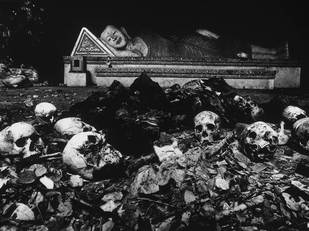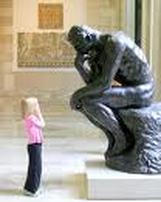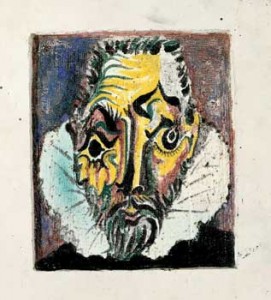The essence of the religious approach is the sensitivity to the meaning and the purpose of life. The wisdom of a religious person is that selfishness is meaningless and that someone can only be good and valuable if he/she is other-centered and caring, so that a person should live for the family, the family for the nation, and the nation for an even wider community. He/she names the purpose of all purposes in God and sees the precondition of goodness in it. On the other hand, the religious approach is insensitive to the aggressive nature behind the ‘legitimacy’ of the authoritative reasoning and the conceptual unclearness. It does not value transiency and uniqueness and considers the individual sacrificable as being a tool of a power and politics that pleads with a community (greater good). A religious person is either self-sacrificing or ruthless.

It is the separation of the good will and the desire for truth that makes them oppositional. They should cooperate. The religious desire for completeness is indispensable for a higher approach and outlook (and it is only identical to the so-called ‘holistic’ vision if it is really universal and does not just remain within a whole of a sub-system), but the religious anthropomorphization and personification that allows a more emphatic and deeper experience also shows an important and different face of the life and the world. In this sense all of those who have deeper feelings cannot avoid being religious at the same time. Nevertheless, logics and laws should not be personified, since that would degrade the otherwise researchable and must-be-researched contexts into an arbitrarily almighty and unmanageable player. According to an atheist, nothing and no one stands above the laws, not even the gods, and it would refer to an ill-omened taste to strive for and to invoke such a player or force who is supposed to be like that. Referring to the ‘almighty’s incomprehensible will’ is one of the thinnest and most malignant verbal violence in the conflicts between people.

More and more think that the meaning of religious thought is the belief that rules out logics, and the less it relies on reason the deeper it becomes. Those think that benevolence can only be justified by hope, and hope can only be guaranteed by the miracle of a protecting mercy. Benevolence can only be justified by a belief that rules out logics in the moments of prayer, when one asks for the miracle of that protecting mercy. Other than that they provide no reason or explanation for the benevolence.
Yet their desire of being able to discuss their problems within the context of religion compels religions to logicality and clearness. Without clear concepts and consistency the religious context becomes inadequate to engage with other contexts and eventually falls into oblivion. The logicization of the authoritative and tradition-centered religious approach necessarily comes with extreme inner pressure and an acute crisis of thought, which from time to time explodes in the form of dogmatic and explicit refusal of logics.
Besides the conventional creation of sense of guilt, authoritarianism and antihumanism, that comes with illogicalism (depolitization and anti-historicalism) are attempted to be humanised by personalism (personification) in the modern age (i.e. Schleiermacher, Renouvier, Buber, Lévinas). The experience of gentleness that comes from the personal attachment and ‘God’ justify each other amidst the context of illogicality.
All this is not about God, rather being a testament about us, human beings.
The most important quality of religiousness – beyond the question of whether being self-satisfied or self-critical – is what it subordinates the concept of ‘God’ to. Why do we think God is right? Do we think ‘God’ is right because it subordinates itself to laws and follows the criteria of truth, or because it ordains itself (‘super-ordinates’) above the laws and therefore it is an unscrupulous power (violent). What do we respect in God? The loveable truthfulness or the fearsome unscrupulousness? Why do horror and the intimidation of others count as moral achievements worldwide? (See the ‘glory’ of a god-fearing personality.)
Not even Satan could have created a better mechanism.

a. logically solvable by radically redefining some key concepts
b. logically unsolvable, but belief in God can solve it, because
- a logical articulation that is directed towards the non-experienceable and the logically non-articulateable infinite totality is destined to fail;
- moreover, the task is logically not accomplishable because of the determining role of the likewise incomprehensible God;
- nevertheless, the personification and eulogy of the incomprehensible (the belief in God) provides hope and makes life emotionally liveable which without the miracle of a higher mercy (posterior redemption) would have the threatening possibility of meaninglessness.
- there is an endless succession of starting contexts that are also conditional to starting contexts;
- no foundation can found itself as everything can only be defined in comparison to something else;
- if the mutual definition of the basic concepts is not gap-free (complete) and is therefore reliant upon other concepts, the founding is unsuccessful;
- if the mutual definition of the basic concepts is gap-free (complete) and is therefore not reliant upon other concepts, then it would become inaccessible for other concepts (and apart from the self-definition of self-definition and the self-foundation of self-foundation it would become useless to define everything else, therefore it would become a meaningless tautology);
- only a construction that is independent from experiences can be logically unconditional and imperative, but such a construction would lack meaning (would be nonsensual), if at all possible - but language and explanation independent from experiences are impossible, however.
1. mythological
There are two worlds within existence: the supersensual world of gods and other powers, and the sensual world of humans which is subordinated to it. Both have possible multiple scenes. The other world of gods rules and it reveals itself in the sensual world at its own will. The link between the two worlds is the human soul, which is supersensual and sensual at the same time. The soul locked into a physical body is divine.
2. Plato (428 – 348 B.C.)
There are two worlds within existence: the real world of the sensually non-experienceable, unchanging, and eternal universalities (ideas), and the illusory world of the sensually experienceable, changing, and transitionary individualities (shadows). God is the world soul penetrating both worlds.
3. Aristotle (384 – 322 B.C.)
There are two worlds within existence: the real world of the sensually experienceable, changing individualities (things), and the illusory existence of the sensually un-experienceable universalities. The world of the individual things consists of the passively changing substance and the actively change-making form in such a way that the supreme form’s (God, the unmoved mover, the self-thinking thought) unchanged relations determine each and every change.
4. Thomas Aquinas (1225 – 1274)
There are two worlds within existence: the sensually perceivable and conceptually conceivable real world, and the illusory world of the sensually non-perceivable universalities. God is neither one being among many others nor it is one substance among many others (it would then again be a being), but existence itself; and only in the case of God (pure existence) existence and substance are consonant, therefore God is the essence and the existence of itself as pure existence, that exists in everything and lets everything be possible.
5. Gottfried Leibniz (1646 –1716)
There are two worlds within existence: the hierarchic world of the non-perceivable, unchanged, eternal individuals (monads, ens reale), and the phenomenal world of the thoughts (ideas, ens mentale) of the supreme monad (God).
6. Immanuel Kant (1724 – 1804)
There are two sides of existence: an unknowable side-in-itself and a knowable side-for-ourself. There are two worlds within the side-for-ourself: the outer world of the objects of cognition, and the inner world of the cognitive subject. The existence of God can neither be proved nor be disproved either logically or by experience, nonetheless we inevitably presuppose it logically for the sake of life’s reasonability.
7. Alfred Whitehead (1861 –1947)
Existence is a process and every actual entity is an infinitely complex, ever changing phase, and partial process of the universally interconnected processes. The world is the creative organism of creative organisms, which reserves contexts in the form of ideas, and eternal objects. The two realms of actual processes and the eternal contexts mutually establish each other. The omni-comprehensive principle and logics is: God.
8. Martin Heidegger (i.sz. 1889 – 1976)
The essence of existence is continuity, changeability, within-time-ness, accidentality, and transiency. The existence of man is ‘here-being’, the experience of togetherness of a God-less world.
9. Ludwig Wittgenstein (i.sz. 1889 –1951)
The language refers to the sensually experienceable world. Whatever cannot be experienced sensually should be not spoken of. Metaphysics, ontology, and theology are pseudo problems that originate in the miscomprehension of language.
It was already born in the earliest analyses of religions at the time of the ancient Greek philosophy, but still active to date (i.e. Heraclitus, Anaxagoras, Statius, Schopenhauer, Nietzsche, Feuerbach, Marx, Comte, Freud, Fromm). Religion is the approach of the premature man. An approach dominated by fear, desperateness, vindictiveness, and hope. A naive approach. A tool of misleading ourselves and/or the masses with the help of illusions. The sign of ignorance.
2. The philosophy of religion as the conversion of religion into philosophy (the most common)
It was born during the period of the formation of the earliest syntheses of religions in the Hellenistic age, but still active to date (i.e. Pythagoreans, Socrates, Plato, Aristotle, Plotinus, the Gnostics, Hegel, Jung, Frazer, Bloch). Religion is the primary approach towards unscrutinized topics. Religious myths harbor rational knowledge that is yet to be revealed. Religion deepens in philosophy, and vice versa. Philosophy is the redefinition of religion and the creation of new religious scripts. Philosophy is the introduction of new gods.
3. The philosophy of religion as the philosophical theology (the classical)
Philosophy placed in serving of religion (i.e. St. Augustine, Anselm, Thomas Aquinas, St. Bonaventure, Descartes, Kant, Marechal, Rahner). The philosophy of religion analyzes the existence and essence of God in the discourse about the beginnings, in the ‘science of primordiality’ (Plato’s archaeology). Its main task is to dissolve the illogicality and unpredictability connected to the concept of God with the indispensable concepts of mercy and hope.
4. The philosophy of religion as the phenomenology of religion (the observing)
The collection of religious terms, the analysis of phrasing in speech (i.e. Pierre Saussaye, Max Scheler, Mircea Eliade). The philosophy of religion puts aside the question of existence and the use of the concept of God, and it analyzes and makes more logical the method of religious argument. It does not engage in researching the existence of God, but in the human use of the concept of God.
The philosophy of religion is not equal with the history of religion, the sociology of religion, or the psychology of religion. The philosophy of religion researches the role the religious thinking and religious concepts (mostly the definition of ‘God’) play in our comprehension. It clarifies three basic principles: religions are not unified, not unchanging, and not complete.





 RSS Feed
RSS Feed
